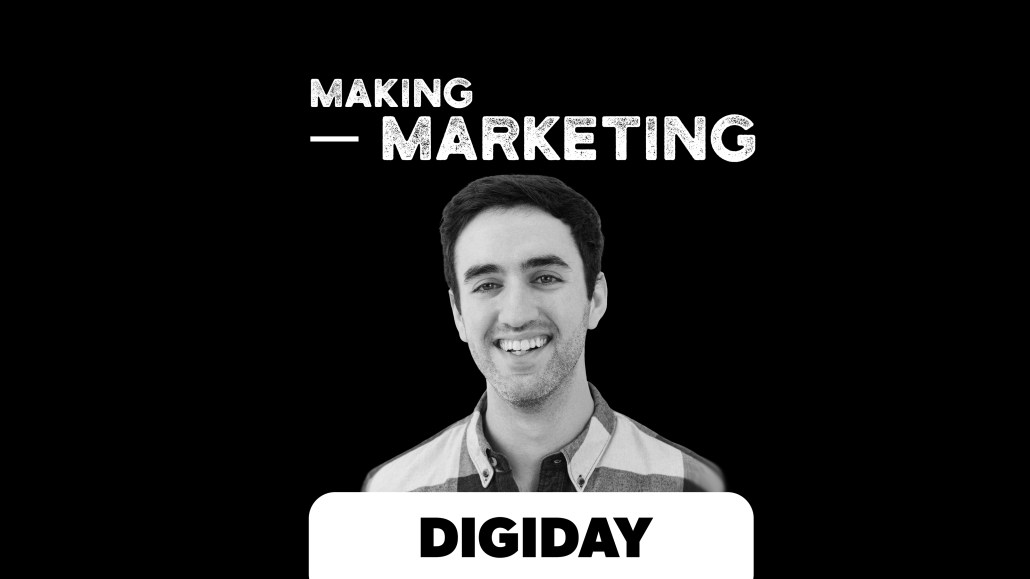Secure your place at the Digiday Publishing Summit in Vail, March 23-25
Thirty Madison’s Steven Gutentag: DTC brands risk being dismissed as an ‘Instagram brand’

Subscribe: iTunes | Google Play | Stitcher | RSS | Anchor
Thirty Madison, the parent company behind men’s hair loss treatment Keeps and migraine treatment company Cove, which just raised a little over $15 million in funding, is using the wellness and health momentum in the DTC industry as it looks to disrupt a giant, $17 billion industry.
Steven Gutentag, co-founder of Thirty Madison, sat down with Shareen Pathak this week to discuss how the launch and growth model works at the company.
“It’s a really great place to be,” said Gutentag on the Making Marketing podcast by Digiday. “You want to be in a place that has attention and so much ripeness for change. Healthcare and wellness hasn’t changed that much [in a long time]. You need to define your message, which is hard to do. It’s a lot easier to run Instagram and Facebook posts and lose sight of your core business. Standing out in healthcare and wellness means making sure every brand has a very clear voice and message. As we develop visual styles for brands, we want to make sure it stands out on feeds.”
Gutentag about going beyond being an Instagram brand, why television advertising works and more. Edited highlights below.
A multi-platform approach to targeting the audience is necessary.
“We had to educate guys on the early signs of hair loss. We advertise on search. But not that many people are searching, especially when we were launching. So we have to reach guys where they are. We started with a variety of different channels. Facebook and Instagram are core parts of that. Then we expanded to podcasts and television, dating apps, influencers, and others. We try to tell guys hair loss is very common and if you take action now, you can keep the hair you have.”
TV delivers legitimacy to the brand.
“I think it’s challenging now to grow Facebook than it was a few years ago. It still remains one of our biggest driver of acquisition. But we took a unique approach. When we first launched, within a month, we launched TV spots. We wanted to reach guys across channels. The other thing that TV does is establish trust. More brands are advertising on Instagram and Facebook so you could dismiss them as an Instagram brand. But on TV, it looks larger to a lot of people. And our ads are not about the treatment, they’re about the problem and starting to take action. The message is straight forward. We see a nice spike in traffic after the spot runs. You see improved conversion when people see you in other channels and it’s not the first time they see you.”
Healthcare is a ripe space.
“People don’t have a primary care physician anymore. They change jobs, they move and never find a new primary care doctor. The way consumers manage their care is functional; they have a problem and they look to solve it. The system doesn’t support that. So it’s confusing experience at best and a dehumanizing experience at worst. There will be a big shift in wellness and healthcare. You have to find people where they are. It can mean where they shop, where they exercise. You have to be accessible. They have to stay connected and you need to know where your customers are coming from. Most healthcare experiences happen offline in the traditional model. So there is a huge space for a shift. There’s opportunity for many companies.”
More in Marketing

‘The conversation has shifted’: The CFO moved upstream. Now agencies have to as well
One interesting side effect of marketing coming under greater scrutiny in the boardroom: CFOs are working more closely with agencies than ever before.

Why one brand reimbursed $10,000 to customers who paid its ‘Trump Tariff Surcharge’ last year
Sexual wellness company Dame is one of the first brands to proactively return money tied to President Donald Trump’s now-invalidated tariffs.

WTF is Meta’s Manus tool?
Meta added a new agentic AI tool to its Ads Manager in February. Buyers have been cautiously probing its potential use cases.








